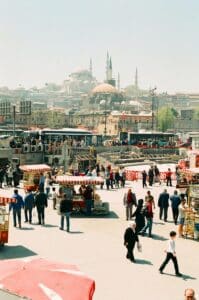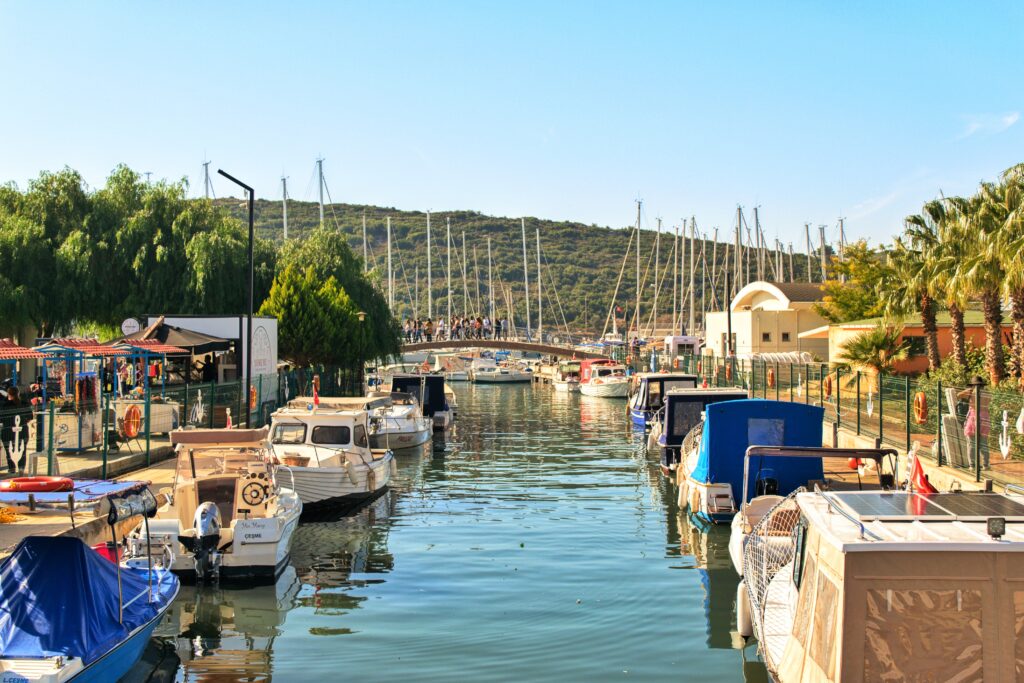Straddling Europe and Asia, Turkey proudly graces the shores of the Bosphorus. This magical land of history and hospitality has much to offer: an abundance of cultural treasures, unforgettable scenery, and the possibility for countless adventures. Foyer Global Health will guide you through your expatriation to Turkey with information key to assist in your successful relocation to this country.
What type of visa do you need to move to Turkey?
Nationals of certain countries must obtain an e-visa for up to 90 days to enter the country while others may be exempt from this requirement.
If you plan on moving to Turkey for more than three months, you will need to apply for a residence permit (ikamet) no later than 100 days after your arrival. The ikamet is for those who have not yet found a job in Turkey. If you already have a job offer, you’ll have to apply for a work permit through the Turkish consulate in your home country while your employer will have to apply for a work permit with the relevant local authorities. A work permit is equivalent to a residence permit.9
Turkey does not offer a specific visa for retirees. Those wishing to move to Turkey for their retirement may apply for a two-year renewable residence permit.
After eight years of continuous residence with proof of not living abroad, you may apply for a permanent residence permit.
Moving to Turkey – pros and cons
Advantages
- Low cost of living: The living costs in Turkey are generally much lower than in some countries in Western Europe and the US when it comes to real estate, food and other daily expenses. The estimated cost of living per month for a family of four is around €1323.6 (27,674.3TL) without rent. On average, the cost of living in Turkey is 55.7% lower than in France.
- Culture and nature figure prominently in Turkey: the country is home to a diverse and rich cultural heritage as well as to natural treasures that expats will have a great time exploring in every corner of Turkey. Travel will be part of your everyday life!
- Turkish people are hospitable towards foreigners
- Safety: as a family, and even as a single woman, you will have nothing to fear for your safety wherever you live, especially in a city like Istanbul
- Secularism: although the vast majority of the population is Muslim, Turkey is a secular country open to other cultures/religions. Turkish society is nevertheless quite conservative.
- Quality of life: low cost of living, scenic landscapes , a rich cultural heritage, quality medical services and an efficient transport infrastructure



Disadvantages:
- The language can be a barrier: learning Turkish will help you navigate daily life as an expatriate in Turkey. English alone will not be enough.
- Low purchasing power: if you are paid in Turkish pounds (a rather unstable currency) under a local contract, you may not have the same amount of money and the same purchasing power as with an expat contract.
What are the best places to live as an expat in Turkey?
If you’re considering living in Turkey as an expat, there are plenty of options to choose from based on your needs, budget, and lifestyle. From seaside resorts to bustling cities, from laid-back towns and high-end hubs, Turkey has something for people from every walk of life. Cosmopolitan Istanbul is by far the most popular destination among expats from all over the world; on the south coast, Antalya is a popular destination for people, especially retirees as it is home to stunning beaches; both modern and traditional, Izmir is among the preferred cities for expat families. Many young foreign professionals choose Ankara as a place to live as this commercial and industrial hub offers good work opportunities.

Working in Turkey
Expatriates in Turkey have several options for work, including local contracts, international expat status, independent contractor, or freelancer.
The legal working time is limited to 45 hours per week and conservative work attire is required in the service sector on all workdays. Expats can leverage professional networks such as LinkedIn to find a job, especially in Istanbul which offers plenty of job opportunities for expats.
Thanks to a good internet connection and numerous co-working spaces, it is possible to work as a digital nomad almost anywhere in the country.
If you are an entrepreneur, it is fairly easy to quickly set up a business in Turkey, regardless of the legal structure you choose; foreign investors are treated in the same way as locals.
Accommodation
In Turkey, accommodation is available in a wide range of options either in the city or countryside based on your profile, needs, income, and expatriation destination. Whether you are a family, single, retired or working, it is fairly easy to rent a property in Turkey, and find a place to live in no time, using real estate websites such as Sahibinden The conditions for buying property, if you do not hold Turkish citizenship, are more restrictive. However, owning property can be a good investment if you are planning to retire in the country.
Education
Although expatriate children have the option to attend Turkish state schools, language barriers can be a real challenge. As a result, the vast majority of expats opt for private international schools which are primarily located in Ankara and Istanbul. These schools offer curricula from different countries (UK, France…) as well as the International Baccalaureate program taught in English. For families living in Ankara, it is critical to apply to their school of choice early on, as international schools tend to be oversubscribed by families of diplomats.
Healthcare
The Turkish healthcare and public insurance system is highly developed and efficient, but there are some disparities between the public and private sectors. The government has established a universal health insurance system that is accessible to the entire population, including those who do not hold Turkish citizenship. In public health facilities, however, waiting times can be long and the quality of medical services can sometimes be subpar. On the other hand, the private sector boasts modern, top-notch medical institutions, offering highly efficient healthcare. As a result, many expatriates opt for private healthcare and a private international health insurance company such as Foyer Global Health to ensure medical coverage in Turkey and abroad.
Key Data and Figures

Number of inhabitants: 84.8 million (World Bank, 2021)
Population: Turks (70-75%); Kurds (19%); others (7-12%)
Cost of living index (excluding rent): 31.17
Official language: Turkish
Capital city: Ankara
Currency: Turkish lira (1 TRY = 0.05 USD)
Political system: Secular parliamentary republic
Religion: Islam
Some of the best experiences all year round:
- Explore the historical heritage of Cappadocia
- Get lost in the Grand Bazaar of Istanbul
- Discover imperial intrigues at Topkapi Palace
- Walk the Lycian Way
- Admire the mythical site of Ephesus, its mosaics and terraced houses
- Sail from Europe to Asia by ferry
- Visit the Blue Mosque and Hagia Sophia to learn about Turkish culture
- Indulge in a traditional Turkish bath at the Kılıç Ali Paşa Hammam
- Spend the night in a wooden house in Safranbolu
- Walk along the Kordon in Izmir
- Attend a whirling dervish ceremony
- Travel to monumental Hadrian’s Gate in Antalya
- Get lost in the Kemeralti Market of Izmir
